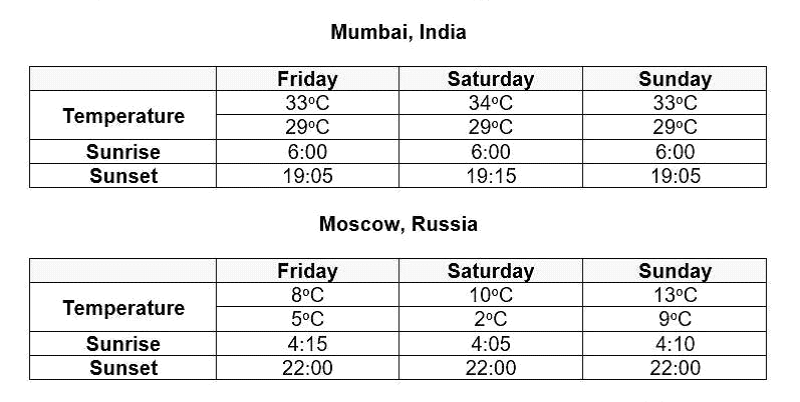ĐỀ WRITING NGÀY 1/8/2019
Task 1:
The tables give information on the temperatures and the hours of daylight in two particular cities in the same week in May 2009

Phân tích đề: đề yêu cầu so sánh hàng ngang số liệu của từng thành phố trong 3 ngày, và so hàng dọc về số liệu của 2 thành phố trong từng ngày.
Rõ ràng 1 nước đang mùa lạnh và 1 nước đang mùa nóng. (2 nước này ở 2 bán cầu nên trái mùa với nhau)
The essay:
The tables compare the temperature and the number of daylight hours in Mumbai, India and Moscow, Russia in the last three days of a week in May 2009.
As can be seen from the tables, in Mumbai, low temperature in the last three days of the week remained the same at 29 degrees Celsius while high temperatures varied between 33 and 34 degrees Celsius. However, the days were much cooler in Moscow where high temperatures increased from 8 degrees Celsius on Friday to 10 degrees on Saturday and 13 degrees on Sunday. A difference of 3-4 degrees between the high and low daily temperatures was seen on Friday and Sunday. Remarkably, the temperature in Moscow was lowest on Saturday at only 2 degrees centigrade, making the temperature of the day slide in the widest range of 8 degrees.
As regards the daytime hours, the sun rose at 6:00 in Mumbai and set right after 19:00 sustaining the daylight in just over 13 hours per day. Meanwhile, daybreak came much earlier in Moscow shortly after 4:00 and daylight lingered until 22:00 to make the day bright in nearly 18 hours.
In general, although May seems to be in the hot season in Mumbai, India, and a cold season in Moscow, Russia, the daylight stayed much longer each day in the latter. (220 words)
Task 2:
In many countries the cost of living is rising. What are the effects on individuals and society? What measures can be taken to deal with this problem?
Outlines:
Effects of the rise in living expenses:
- On individuals: instead of having money for investment, people have to make ends meet; more financial pressure, fewer chances for buying properties, or establish business because investment money will be rare.
- On society: increasing consumer price index is the indication of inflation, of international trade deficits, of danger of bubble economy, of imbalanced economic development, make people worry
Solutions:
- In case of inflation:
- Government stabilize prices of main consumer goods like food and gasoline to reduce negative impacts of the hike of consumer prices on the public. (price control is only temporary method)
- High interest rates to discourage the borrowing of money for spending and investment => slow down the heated economy, increase propensity to spend
- In case of imbalanced economy:
- improve value of products created à higher pay for workers
- improve productivity, reduce wasted time => create enough for the need of society => avoid scarcity of consumer products & keep price reasonable.
Vocabulary
alleviate | əˈliːvɪeɪt | (n) làm giảm nhẹ |
exert pressures on | ɪgˈzɜːt ˈprɛʃəz ɒn | (n) gây sức ép lên |
make ends meet | meɪk ɛndz miːt | (n) đủ sống qua ngày |
tight financial situation | taɪt faɪˈnænʃəl ˌsɪtjʊˈeɪʃən | (n) tình hình tài chính khó khăn |
consumer price index | kənˈsjuːmə praɪs ˈɪndɛks | (n) chỉ số giá tiêu dùng, là tỉ số giá của rổ hàng tiêu dùng (tầm 500 mặt hàng thường dùng) của 1 năm so với 1 năm gốc nào đó. Ở Việt Nam, các năm gốc là 1995, 2000, 2001, 2005, 2009 và bây giờ là 2014 – heo Tổng Cục Thống Kê Việt Nam) |
depreciation of the currency | dɪˌpriːʃɪˈeɪʃən ɒv ðə ˈkʌrənsi | (n) sự mất giá của đồng tiền |
inflation | ɪnˈfleɪʃən | (n) lạm phát |
trade deficits | treɪd ˈdɛfɪsɪts | (n) thâm hụt thương mại (nhập khẩu nhiều hơn xuất khẩu) |
public spending | ˈpʌblɪk ˈspɛndɪŋ | (n) chi tiêu công – chi tiêu của chính phủ |
Debt default | dɛt dɪˈfɔːlt | (n) tình trạng vỡ nợ |
consumer goods | kənˈsjuːmə gʊdz | (n) hàng tiêu dùng (có vài trăm mặt hàng) |
subsidy | ˈsʌbsɪdi | (n) trợ cấp (trợ giá) |
monetary measures | ˈmʌnɪtəri ˈmɛʒəz | (n) biện pháp tài chính |
central banks | ˈsɛntrəl bæŋks | (n) ngân hàng nhà nước |
propensity | prəˈpɛnsɪti | (n) xu hướng |
management mechanisms | ˈmænɪʤmənt ˈmɛkənɪzmz | (n) cơ chế quản lý |
productivity | ˌprɒdʌkˈtɪvɪti | (n) năng suất lao động |
The escalation in living expenses is a common problem in many countries worldwide. This essay will look into the impacts of this phenomenon on individuals and society as a whole and then will present measures to alleviate the issue.
The increasing living costs exert pressures on each person and on the whole society. On a personal level, instead of having extra money for investment on properties or starting businesses, people may have to make ends meet with huge bills that have taken up a major portion of their incomes already. In such a tight financial situation, the material life is heavier, and workers will be subjected to more stress. On the other hand, for society, increasing living costs means escalating consumer price index, which is normally seen as a sign of depreciation of the currency, and the inflation of the national economy. It can also mean the imbalance in international trading and government budget with some trade deficits and huge public spending. If the situation is not soon resolved, it may lead to the financial crisis of countries which makes them come to a debt default like what happened in Zimbabwe in the last decade.
Fortunately, there are solutions for dealing with increasing living expenditure. First, in case of inflation, the government can stabilize the prices of main consumer goods like food, gasoline, and electricity to reduce negative impacts on the public; however, price control is only a temporary method because it may require subsidy from a limited government budget. Moreover, monetary measures can be used to increase interest rates in central banks and then in commercial banks to discourage people from borrowing money to pump into society through spending and investment. That will cool down the heat of the economy and increase the public propensity to save money instead of spending it. Second, in case of an imbalanced economy, measures should focus on improving the value of products and thus yield higher pay for workers. Also, companies should develop management mechanisms to improve productivity and reduce wasted time so that workers will create enough for the need of society to keep prices reasonable.
In conclusion, higher bills people have to pay for their living negatively influence individuals and show signs of weaknesses in the economy of nations. Therefore, measures to prevent or curb inflation should be taken into serious consideration while the quality of business operation should also be improved to ensure the balance in social supply and demand. (410 words)
